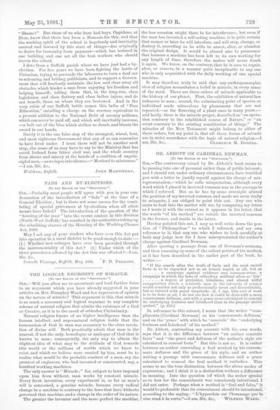DR. ABBOTT ON CARDINAL NEWMAN.
[To THE EDITOR OF THE "srscrkTon."3 SIR,—The controversy raised by Dr. Abbott's book seems to be passing into one of personal rather than of public interest ; and I should not, under ordinary circumstances, have troubled you with a letter to justify myself against his charge of mis- representation,—which he calls misquotation, although every word which I placed in inverted commas was in the passage to which I referred. But as he has by some oversight altered
the position of my inverted commas, and made me seem really to misquote, I am obliged to point this out. Any one who cares to look into the matter will see, by comparing my letter as I wrote it with the extract as it appears in his letter, that the words "of his method" are outside the inverted commas in the former, and inside in the latter.
Having pointed this out, I may as well write down the por- tion of " Philomythns " to which I referred, and my own reference to it, that any one who wishes to look carefully at both may judge how far I have misrepresented the author's charge against Cardinal Newman.
After quoting a passage from one of Newman's sermons, and then summing up some of the salient points of his method, as it has been described in the earlier part of the book, he writes :—
" If the search after the truth of facts and the most sacred facts is to be regarded not as an honest search at all, but as a campaign against evidence and common-sense, a campaign in which the laws of orthodoxy militant allow as fair' a degree of prejudice, blindness, and almost wilful exaggeration which a scientific man in the interests of science would consider not only as professionally moan and discreditable, but as tainted with moral turpitude—if, I say, this sort of work is to be done at all, I do not see how it could be done with a more consummate deftness, and with a grace more calculated to conceal its underlying foulness and falsehood than in the passage above quoted." (p. 252.)
In reference to this extract, I wrote that the writer "com- pliments [Cardinal Newman] on his consummate deftness,' and on the grace' with which he conceals' the underlying foulness and falsehood' of his method."
Dr. Abbott, contrasting my account with his own words, says that it is the difference between "an author conceals facts" and "the grace and deftness of the author's style are calculated to conceal facts." But this is not so. It is rather between an author concealing a foul method by his consum- mate deftness and the grace of his style, and an author writing a passage with consummate deftness and a grace calculated to conceal the foul method it embodies. This seems to me the true distinction between the above modes of expression ; and I think it is a distinction without a difference in meaning. Into the question (of which the writer speaks) as to how far the concealment was consciously intentional, I did not enter. Perhaps when a method is "foul and false," it would be preferable that its concealment should be intentional, according to the saying : " L'hypoerisie est l'hommage que la vice rend n la vertu."---I am, Sir, &a., WILFRID WARD.


































 Previous page
Previous page